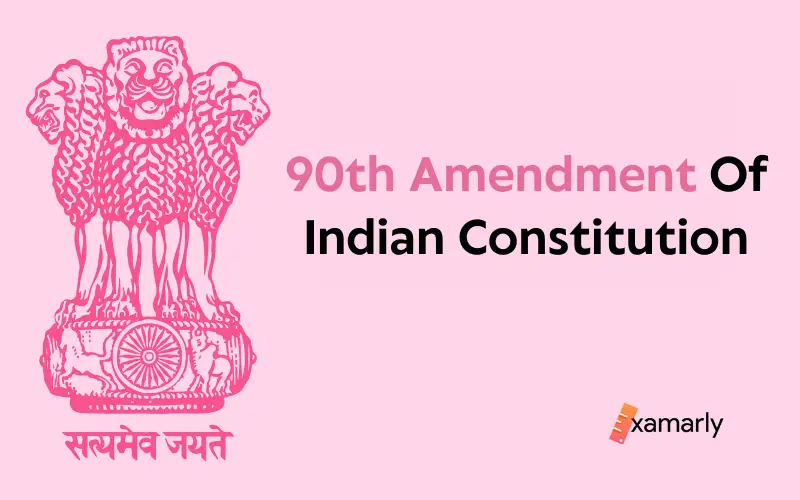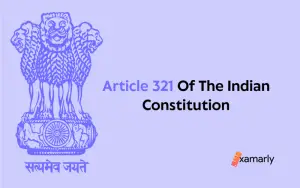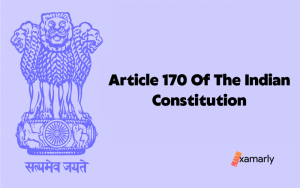This article gives an overview of the 90th Amendment of Indian Constitution. It discusses salient features and facts, Statements of Objects and Reasons, and Prominent People Involved. It also includes a brief discussion of how the amendment came about. The article also calls for more economic participation in cooperatives, the setting up of a National Judicial Commission, and the repeal of the collegium system for appointing judges.
The 90th Amendment Of Indian Constitution
The 90th Amendment of Indian constitution is an additional Act to modify the Indian Constitution. Reservation of seats that were given to the members of the Scheduled Castes and Scheduled Tribes in the state legislatures under Article 332 of the Indian Constitution (90th Amendment Act). The Constitution (Ninetieth Amendment) Act, 2003, is another name for this legislation.
The 90th Amendment of the Indian Constitution is aimed at bringing about a comprehensive change in Indian politics. The amendments include several important changes. Under this law, Bodo speakers could be able to vote in the Bodoland territorial region. The constitution also includes provisions to help the Bodo people get their due.
Statement Of Objects And Reasons
- Members of the Scheduled Castes and Scheduled Tribes will have reserved seats in the state legislatures under Article 332 of the Indian Constitution (90th Amendment Act). By Clause (6) of Article 332, no person who is not a member of a Scheduled Tribe may run for the election in any seat of any autonomous district of the State of Assam.
- The current representation of the Scheduled Tribes and non-Scheduled Tribes in the Legislative Assembly of the State of Assam from the Bodoland Territorial Council Areas District is proposed to be maintained by the Memorandum of Settlement signed on the 10th day of February 2003 between the Governor of India, Government of Assam, and the Bodo Liberation Tigers, as well as to protect the rights of the non-tribal. Therefore, it is suggested that clause (6) of Article 332 of the Constitution be amended to include a proviso.
- The above goals are what the bill aims to accomplish.
Related – 92nd Amendment Of Indian Constitution
Salient Features And Facts
- The Scheduled Castes and Scheduled Tribes are given seats reserved in the Legislative Assemblies of the States under Article 332 of the Indian Constitution. Clause (6) of article 332.
- This amendment clearly states that no person who is not a member of a Scheduled Tribe may seek a position in the State’s Legislative Assembly from any seat inside any autonomous district of the State of Assam.
Date Enacted
This amendment was enacted by the House of Parliament in the fifty-fourth year of the Republic of India, on 28th September 2003.
Important Provisions
Amendment to Article 332. The proviso listed below shall be introduced after clause (6) of Article 332 of the Constitution, namely:
As stated in the announcement and as it existed before the creation of the Bodoland Territorial Areas District, the representation of Scheduled Tribes and Non-Scheduled Tribes in the constituencies included in the Bodoland Territorial Areas District shall be maintained for elections to the Legislative Assembly of the State of Assam.
Bodoland Territorial Region
The 90th Amendment of Indian Constitution aims at bringing the Bodoland region under the purview of the federal government. This includes the entire area of the Bodoland Territorial Areas District (BTAD) as well as the areas that are covered under the Sixth Schedule of the Indian Constitution.
A planned state and autonomous area in Assam, Northeast India, is called the Bodoland Territorial Region (also known as Bodoland). On the north bank of the Brahmaputra River, below the foothills of Bhutan and Arunachal Pradesh, it is divided into five districts. It is governed by the Bodoland Territorial Council, an elected body established by the conditions of a peace deal agreed upon in February 2003.
The associate official language for the entire accord would be Bodo with Devanagari script. The agreement did not address the subject of “citizenship or work permit” for non-domiciles in the BTAD. Bodo-Kachari Welfare Council was constituted to focus on the development of Bodo Villages which lies outside the BTAD
History Of Bodoland
After the British era, there was a Bodo-Kachari kingdom in Assam which constitute about 5-6%of Assam’s population. The history of Bodoland can be divided into two phases: the first is the early twentieth century and the second is the present.
The first period includes the creation of the Bodo organization. This group fought for their identity and free, prosperous life. The second period covers the formation of the Bodoland Territorial Council and the subsequent settlement of land, culture, and language issues.
In 1993, Bodo Liberation Tigers Force was created, this group was formed to fight for the creation of a Bodoland state in the Union of India. The Bodo Liberation Tigers fought for a separate state by the Constitution of India and its constitutional provisions of India.
Summing Up
90th amendment of Indian constitution played a pivotal role in preserving the rights and social validation of Bodoland and its people. A step to secure the minorities was reflected through the enactment of this amendment.
FAQ’s
Who are Bodo in Assam?
The Brahmaputra River Valley’s northernmost regions are home to the majority of Assam’s minority population, the Bodo. Although they traditionally engaged in shifting cultivation, the majority of them are permanent farmers today. Many different tribes make up the Bodo.
Are Bodo and Assamese same?
The origins of the Bodo and Assamese languages are distinct. The Bodo language is a member of the Indo-Iranian branch of the Indo-European language family, while Assamese is a member of the Tibeto-Burman branch of the Sino-Tibetan language family. Both languages have a large number of word differences.






